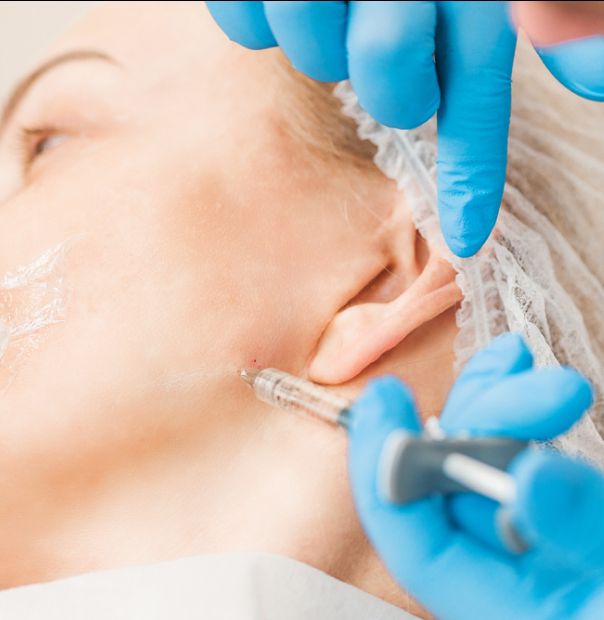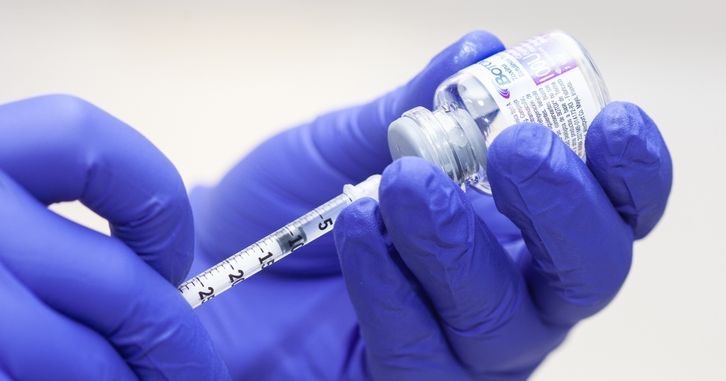botox
Discover how Botox injections can help alleviate jaw pain, reduce muscle tension, and improve your quality of life.
Botox is widely known for its cosmetic benefits, but it is also an innovative, non-invasive treatment for TMJ disorders. Temporomandibular joint disorder (TMD) often causes chronic pain and discomfort due to tension in the jaw muscles, leading to jaw clenching, headaches, and even difficulty chewing. Botox works by relaxing these overactive muscles, which helps relieve jaw pain, reduce muscle tension, and ease other TMJ symptoms. With just a few targeted injections, patients can experience significant relief without the need for surgery or more invasive procedures.

Invisalign Offers a Range of Benefits for Patients Experiencing TMJ Symptoms Invisalign is widely known for its ability to straighten teeth with clear, removable aligners. However, it can also be highly effective in alleviating symptoms associated with TMJ disorders. By addressing the underlying issue of bite misalignment, Invisalign helps to relieve the pressure and tension on the temporomandibular joint (TMJ), reducing pain and discomfort. Here are some key benefits of choosing Invisalign for TMJ treatment:

Botox relaxes the muscles responsible for jaw clenching and teeth grinding (bruxism), relieving pressure on the TMJ.
Unlike surgical procedures, Botox is minimally invasive, with no downtime or recovery needed.
Botox injections are quick to administer, and many patients experience relief within just a few days of treatment.
Botox not only relieves jaw tension but can also help reduce headaches, neck pain, and facial discomfort caused by TMJ.
Each Botox treatment is tailored to your specific needs and is administered by a trained professional to ensure safety and effectiveness.


Botox for TMJ is a straightforward, comfortable procedure that takes only a few minutes to complete. Here’s what you can expect during your treatment:
During your initial consultation, our specialist will assess your TMJ symptoms and determine if Botox is the right treatment for you. We’ll discuss your medical history and any concerns you may have.
The Botox is injected into specific areas of your jaw muscles to reduce tension and relieve pain. The number of injections may vary depending on the severity of your symptoms.
Botox injections are typically well-tolerated, and the procedure causes little to no discomfort. A topical anesthetic can be applied if needed for added comfort.
There’s no downtime required after Botox treatment. You can resume normal activities immediately following the procedure.
ou’ll begin to notice improvement in your TMJ symptoms within 3-5 days, with full results typically achieved in about two weeks. The effects of Botox generally last for 3-4 months, after which follow-up treatments may be recommended.
Botox typically provides relief for TMJ symptoms for about 3 to 4 months. The exact duration may vary depending on individual muscle activity and the severity of the condition. Regular follow-up treatments can help maintain consistent relief.
Yes, Botox is a safe and FDA-approved treatment for muscle tension and pain. When administered by a trained professional, it effectively relaxes overactive jaw muscles, providing relief with minimal risk of side effects.
Most patients notice significant improvement after their first session, but the number of treatments depends on your individual condition. On average, patients may require 2 to 3 sessions per year to maintain optimal results.
Botox injections involve minimal discomfort and are typically well-tolerated. The needle used is very fine, and the procedure is quick, usually lasting only a few minutes. For added comfort, a topical anesthetic can be applied if needed.
Yes, Botox can be used alongside other TMJ treatments such as custom mouthguards, physical therapy, or orthodontics. Combining treatments often provides comprehensive relief and addresses both symptoms and underlying causes.
Side effects are typically mild and may include slight bruising, redness, or tenderness at the injection site. These effects usually subside within a few days. Serious complications are rare when Botox is administered by a qualified professional.
Many patients start noticing a reduction in jaw tension and pain within 3 to 5 days after the procedure, with full results typically achieved in about 2 weeks.
When administered correctly, Botox targets specific muscles and should not interfere with normal functions like chewing or speaking. Our team ensures precise injections to maintain natural movement while relieving tension.
Botox provides temporary relief by relaxing the muscles, but it is not a permanent solution. Regular treatments can help manage symptoms effectively over time. For a more permanent fix, your provider may recommend additional interventions.
If you experience persistent jaw pain, clenching, or headaches associated with TMJ, a consultation with our specialist can determine whether Botox is a suitable treatment for your condition.
Take the first step towards lasting relief and improved oral health by scheduling a private consultation and diagnosis appointment with our expert team. During your personalized session, we will carefully evaluate your condition, address your concerns, and develop a customized treatment plan tailored to your unique needs. Don’t wait—experience professional care and start your journey to a pain-free life today.